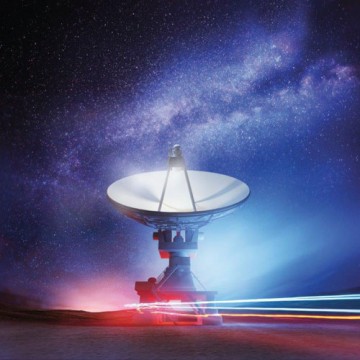Recent results do not support the conclusion that we are alone in the universe.
Scientists have found new evidence suggesting that we are, after all, quite possibly alone in the universe - or so you may have heard. Don't believe it.

The biggest discovery of our time is that planets are at least as common as stars. Strangely, some have interpreted this as implying that intelligent, technological, communicating life has not evolved elsewhere. One who has expressed this view recently is William Borucki, the just-retired principal investigator for NASA's remarkable Kepler spacecraft and thus the person most responsible for our recent bounty of knowledge about extrasolar planets. While in Hong Kong last September to receive the 2015 Shaw Prize in astronomy, Borucki told reporters that, given our new knowledge of so many worlds, we can conclude that intelligence has not evolved elsewhere. "Why haven't we been contacted?" he asked. His conclusion: "The evidence says, no one's out there."
Borucki is a brilliant and wonderful man, and we are forever in his debt for the success of Kepler. But there is little basis for jumping to this conclusion. In fact, for decades, SETI had already operated under the considered assumption that planets around stars were common. At the first SETI conference in Green Bank, West Virginia in 1961, the attendees reached agreement on an estimate for the number of planets in the galaxy that was very close to the numbers scientists are now deriving from observations. While beautifully reducing the uncertainty, Kepler has also essentially validated the intuitive hunches about planets that the early SETI investigators held.
In the six decades since the first radio searches, we've learned that our galaxy is not bristling with civilizations broadcasting the kind of radio messages predicted by some physicists in the 1950s, and that our solar system is not so teeming with obvious interstellar probes that we would stumble upon one on our first fleeting forays to other planets. That is all we know. It's a far cry indeed from that to "we are alone."
Another recent headline touts a study showing that alien "supercivilizations" don't exist. The evidence? When we scan distant galaxies, we don't see any that are radiating the kind of waste heat that would be seen if a civilization had overrun the galaxy, maximizing its population and consuming the energy of every star.
Seriously? What kind of supercivilization would behave in that manner? Only those conforming to some very primitive notions of what constitutes a civilization. The premise is that successful lifeforms will keep on multiplying indefinitely, and that successful civilizations will seek out and use more and more energy. But we are already learning here on Earth that true, sustainable intelligence may require thoughtful deviation from the drive to mindlessly propagate and utilize whatever resources we can get our hands on. It seems doubtful that any "advanced" civilization would act like that.
Finally, I keep hearing about the "great filter." Supposedly, some universal process exists that stops civilizations from continuing. According to this idea, "the great silence" means that our own days are numbered. When you carefully examine this argument, you find again that it rests on the false notion that we already have good evidence of the absence of other civilizations, or on the other argument that, if there were civilizations, they would make their presence so apparent that we couldn't possibly miss them. The detailed justifications always make wild, unsupported assumptions about the properties and behaviors of aliens.
These are all fun ideas to entertain, but people tend to get attached to certainty and start to believe they know the answer. The only clearly mistaken opinions on this beguiling question are those that are overconfident. We have to be comfortable with the uncertainty of not knowing, resist easy answers, and keep exploring the universe with open minds and all the tools and techniques we can muster.
This Cosmic Relief column first appeared in print in the January 2016 issue of Sky & Telescope.
 0
0
Comments
You must be logged in to post a comment.